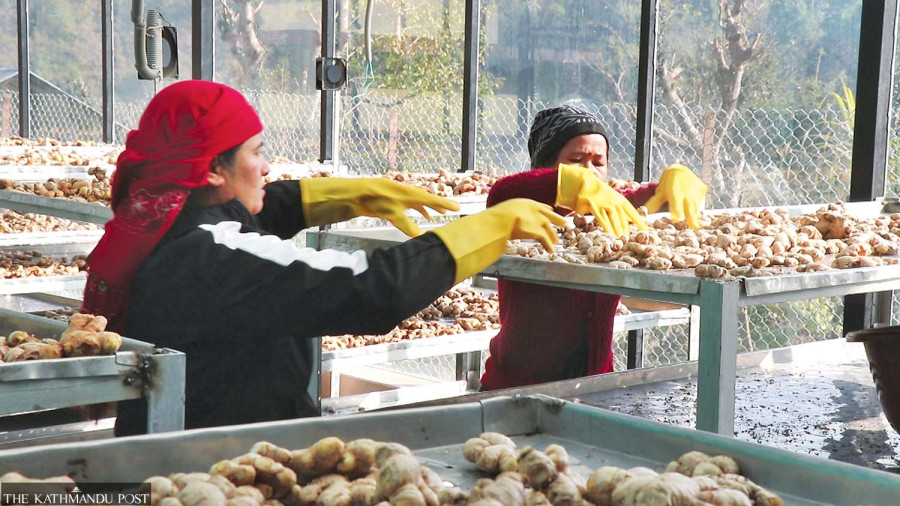Money
How a Nepali village is going global with ginger, beans
A remote women-led cooperative in Galdha, Palpa, exports tonnes of organic ginger and beans to European markets, transforming the local economy.
Madhav Aryal & Sangam Prasain
A remarkable story of transformation unfolds in the hills of Palpa, where rough, winding roads make even a short journey an ordeal. Tucked away in Nisdi Rural Municipality-5, the village of Galdha has become an unlikely player in the European spice and legume markets, thanks to the determined efforts of local women farmers and their cooperative.
Dilmaya Saru, the manager of the Galdha Social Entrepreneur Women’s Cooperative, waits for November like a shopkeeper waits for the festive rush. That’s when the ginger is ready to harvest, and she begins calling farmers for meetings. The prices are negotiated, changing year to year depending on the global market. What was once a limited, low-value trade with middlemen has now turned into a direct link to Europe—an export economy built from scratch by local hands.
Just a month ago, 23.25 tonnes of fresh and dried sliced ginger from Galdha were sent to Europe, mainly to Germany and the Netherlands. Of that, 14.56 tonnes were dried sliced ginger, which had been processed from around 65 tonnes of fresh ginger.
The shipment earned the cooperative Rs7.19 million. It was the second consignment of the year. Earlier, the cooperative had exported 8.69 tonnes of organic-certified fresh ginger, bringing in another Rs819,467. In 2024, they sent a small trial shipment of 805 kilograms of sliced ginger to test the European market.
All of this wasn’t possible a few years ago. But three years back, the cooperative started exporting dried ginger, and this year, they took a leap forward by exporting fresh ginger with an organic certification from CERES, a respected international inspection and certification body for organic food. That certification changed everything.
“That’s been a breakthrough for the ginger trade,” said Saru. “I heard … It took three months for our ginger to reach Europe by ship. That’s too far.”
Now, only ginger from certified farms can be exported. The cooperative has 272 women farmers under its umbrella, and more are joining. The process is strict—forms must be filled out, fields must be inspected, and lab tests conducted before certification is granted.
To support the exports, the women built a ginger processing factory, a project they worked on for four years with help from several development partners. The factory, now up and running, washes, chops, dries, and packages the ginger hygienically and systematically.
Nepal is the fourth-largest producer of ginger in the world, with a 2023 output of 309,533 tonnes, trailing India, Nigeria, and China. But despite this scale, Nepal's ginger was often underpriced, largely due to a lack of certification and quality control. Nearly all of it was sold to India, where it’s used in Ayurvedic medicines and food products like candies, sauces, and jams.
Ginger is often stopped at the Indian border due to quality issues, and farmers were the ultimate sufferers.
The story could have ended there, but not for the women of Galdha, who saw a better future. There is a growing demand in the global market, and they want in.
Ammaya Mashrangi, the cooperative’s chairperson, said buyers were looking for 20 tonnes each of fresh and dried ginger this year. However, they had to turn some buyers down because they couldn’t meet the demand.
“Our village farmers want to grow more,” she said. “But they are asking for market assurance first.”
Support came from organisations like Heifer International Nepal, which focuses on equitable development, and aQysta Nepal, an agri-tech company. These groups helped the cooperative with production techniques and connected them to foreign buyers.
Narayani Dhungana, a farmer and member of the cooperative, now sees ginger as more than a crop—it’s a path to women’s empowerment. “It’s becoming our cash crop,” she said. The cooperative plans to expand organic certification to neighbouring villages like Jyamire, Mityal, Jhiruwas, and Sahlakot.
Before the cooperative came into the picture, farmers from Nisdi sold their ginger to traders who moved the spice as far as Butwal, Bhairahawa, Kathmandu, and sometimes India. It was a fragmented system with poor returns for the growers.
Palpa grows ginger on 1,410 hectares, yielding 15,581 tonnes annually. A study shows that Nepal’s ginger has high oil and oleoresin content, making it valuable to industrial buyers, if quality can be maintained and volumes increased.
But ginger isn’t the only export.
The cooperative has expanded into white beans, and the response has been enthusiastic.
Gorimaya Soti Magar, a farmer from Banglang in the same rural municipality, was thrilled when she heard that her white beans would be exported to Europe. “I heard our beans will go to Europe,” she said, her face lighting up. “It would be great if this continued every year.”
She promptly gathered her beans, sorted them, and handed them to the cooperative. Unlike in previous years, when she had to deal with middlemen offering Rs130 to Rs140 per kilo, the cooperative paid her Rs165. She sold 669 kilograms and earned Rs110,000.
Another farmer, Umoti Devi Soti Magar, also benefited. She sold 407 kilograms for Rs67,155. “Earlier, we had to accept whatever price they gave us,” she said. “Now, with the cooperative’s help, I got a much better deal.”
According to Saru, this year the cooperative bought 25 tonnes of white beans and 3 tonnes of black and brown beans from local farmers—a total of 28,140 kilograms, costing around Rs4.56 million. From that stock, 20 tonnes of white beans are being prepared for export, mainly to Germany.
“That’s just the beginning,” said Saru. “If these products find regular European buyers, the income from our village could skyrocket.”
“This transformation is not just about exports and income. It’s about how women in a remote village, long cut off from modern markets, are taking charge of their economic destiny,” said Prabin Gurung, knowledge management and communication manager of Heifer International Nepal.
“Through their cooperative, they have built infrastructure, met strict international standards, and proved that even the most isolated communities can become part of the global economy.”
The bumpy road from Palpa’s headquarters to Galdha may still be treacherous. But for the women who travelled it with determination, it now led to Europe.




 14.12°C Kathmandu
14.12°C Kathmandu














